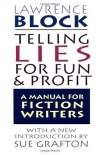Manual For Fiction Writers by Block, Lawrence (classic books to read .TXT) 📗

Book online «Manual For Fiction Writers by Block, Lawrence (classic books to read .TXT) 📗». Author Block, Lawrence
I think, though, that an increasing ability to discriminate between good and bad writing has had at least as much to do with my changed attitude toward what I read. The writing I do, day in and day out (whatever that means), has served to make me perhaps excessively aware of the technique of other writers. When I read the work of someone lacking in craft, I know it. This knowledge, this acute awareness, interferes with the voluntary suspension of disbelief upon which fiction depends for its effectiveness.
If my writer's ear tells me the dialogue I am reading is unnatural and clumsy, how am I to make myself believe in the existence of the characters who are speaking it? If my writer's perceptions force me to notice that I am reading lumpish prose, how can I lose myself in the story?
As a result, any number of bestsellers with considerable popular appeal leave me colder than an editor's smile. They may tell a good story, but if I can't get past the writing I can't enjoy that story.
I don't mean to imply that people who do enjoy such books are to be condemned for their enjoyment. More often than not, I envy them. They're having a good time, while I, a lifelong reader, am having an increasingly difficult time finding something to read.
There are compensations, however.
Because when I do find something good, I can enjoy it on several levels at once. On the most basic level, I can get caught up in the story as inextricably as the rankest soap-opera addict. I can laugh when it's funny and cry when it's sad. That, after all, is what fiction is for, and if anything, my professional involvement with the stuff has intensified my ability to respond to it?when it's good.
At the same time, I always have my writer's eye open when I read something well-written. However involved I may be in the fate of the characters, I allow myself to notice what the writer is doing. When something works, I try to figure out what makes it work so well. When one paragraph in an otherwise smooth novel seems a little rough, I take a moment to try to figure out what off-note soured the chord.
Sometimes, when I'm reading, I find myself doing a little mental rewriting. Does this one particular conversation go on too long? Suppose a couple of responses were eliminated?would that speed things up? Is this transition too abrupt? Or would things move more effectively if we had a fast cut here?
You might think that reading like this would be like sleeping with one eye open, that the writer's awareness would inhibit the reader's involvement. Curiously enough, it doesn't seem to work that way. I've seen musicians at concerts sitting in the audience and following the score as they listen to the music, and I've been given to understand that this can heighten their enjoyment of what they're hearing. In a similar fashion, my involvement in what I read can be intensified by my awareness of just what the writer is doing.
The flip side of the whole process is at least as important. One never stops learning the tricks of our particular trade, and I've found that my continuing education takes place in two classrooms, my office and my library. I learn by writing and I learn by reading. If the years I've spent writing have raised my consciousness as a reader, so do the books and stories I read continue to sharpen my skills as a writer.
The extent to which I've changed as a reader is never more apparent than when I reread something I haven't looked at in years. Sometimes this can be a very disappointing experience. There are writers I treasured in adolescence whose books I find quite impenetrable today, not because they've deteriorated but because I look on them with altogether different eyes now. I was less critical then, less capable of reading as a writer, and when I turn their pages now I want to weep for my own lost innocence.
These disappointments are more than made up for by the great delight of rediscovering an old favorite and finding I like it more than I ever did?because now I'm far better equipped to appreciate the author's excellences. It seems to me that every time I return to John O'Hara and Somerset Maugham I discover new evidence of their enormous craft. Years ago I read their novels and short stories for several reasons?for sheer story value, to make the acquaintance of their characters, and for what light their auctorial intelligence could shed upon such matters as Life and Truth and Beauty.
I still read them for these reasons, and get more out of them than I ever did. But at the same time I am more aware now of the manner in which they achieve particular effects. I observe, while caught up in the story of The Moon and Sixpence, say, how Maugham wields the perspective of his narrator like a conductor's baton.





Comments (0)